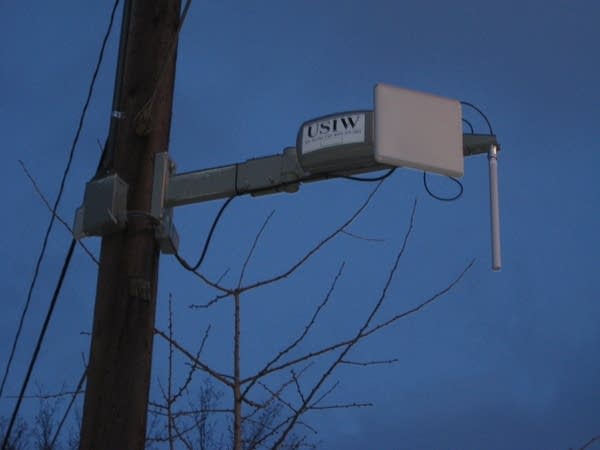Minneapolis Wi-Fi network to be completed by month's end

For many cities in Minnesota and across the country, creating municipal Wi-Fi has been much tougher to implement than it was to imagine.
St. Louis Park, Minn., recently abandoned its solar-powered network, and it is considering suing the service provider to help recoup its losses.
And the city of Moorhead, Minn., lost $1 million on its struggling Wi-Fi system after a series of glitches led half its subscribers to cancel their service.
The Minneapolis network has also run into problems.
Create a More Connected Minnesota
MPR News is your trusted resource for the news you need. With your support, MPR News brings accessible, courageous journalism and authentic conversation to everyone - free of paywalls and barriers. Your gift makes a difference.

The builder of the network, Minnetonka-based U.S. Internet, underestimated the amount of hardware it would take to provide proper coverage. The company's Vice President of Marketing, Joe Caldwell, said U.S. Internet had to spend a few million dollars more to fix the problem. But he said the company has learned from its mistakes.
"You've got a company here in Minnetonka that's pulled off some things that some gigantic companies have failed at doing. This has become the poster child for municipal Wi-Fi networks," said Caldwell.
Recent articles in the New York Times and from CNET online hold up Minneapolis as a success story compared to failed or failing networks.
Wi-Fi efforts in cities like San Francisco, Philadelphia, Portland, Tempe, Houston and Miami have experienced serious setbacks for a couple different reasons.
Many of these cities signed contracts with Earthlink, an Atlanta-based company known as the nation's leader in municipal Wi-Fi. In fact, Earthlink bid on the Minneapolis contract.
But recently Earthlink announced it was getting out of the Wi-Fi business, and its withdrawal put the future of many of its projects in jeopardy.
Many tech experts say what best distinguishes Minneapolis from the rest of the pack is its business model.
"Most of the other implementations around the country relied mostly on subscriber services," said Peter Fleck, an IT professional and tech blogger who lives in Minneapolis.
Fleck serves on the advisory board of a fund that uses money donated by U.S. Internet to give grants to groups working to close the digital divide. Fleck is not an employee of U.S. Internet.
Fleck said the Minneapolis business model works, because it doesn't rely solely on income from subscribers. The city has agreed to be an anchor tenant. Fleck said that provides stability for the company that it needs during the shaky early stages of implementation.
"In Minneapolis the city is paying U.S. Internet for services for the city itself. And so U.S. Internet has a good anchor tenant on it, and they then can also bring in subscribers," Fleck said.
As an anchor tenant, the city accounts for more than $1 million a year. So far U.S. Internet has signed up more than 5,000 subscribers. Company officials said 8,000 people have preregistered for the service, and they said the network will be self-sustaining once they reach 10,000 subscribers. And they say the company really hasn't done much marketing for the service.
Fleck said U.S. Internet service costs a little less than the other major internet service providers in Minneapolis, such as Qwest and Comcast.
But its main advantage is that it's portable. That's particularly useful for people with new generation cell phones or other handheld devices that allow users to surf the Web and download audio and video.
However, Fleck said competition will be tough, because free Wi-Fi signals are already available just about everywhere, not just in coffee shops. In addition, U.S. Internet connection speeds are slower than cable.
"I think they have a good model, and I think if they can provide the customer support and service that's going to be necessary, I think they have a good chance of competing with Qwest and Comcast," Fleck said.
U.S. Internet's customer support services have been put to the test throughout the construction of the network.
City officials said there are still about a dozen one or two-block sections of the city they are calling "challenge areas," which have problems getting reception.
A large section of the city near Loring Park is still dark, because U.S. Internet has not been able to access enough utility poles to hang the transmitters on. Company officials said they've worked that out, and will fill in the challenge areas after the rest of the network is done.
